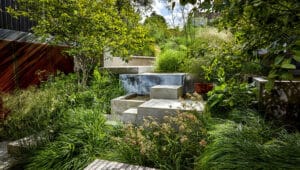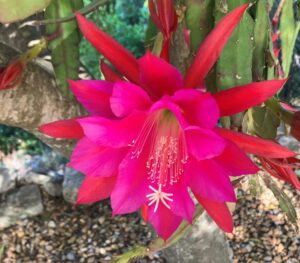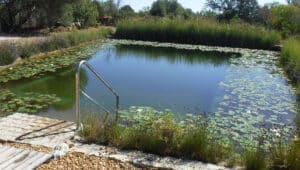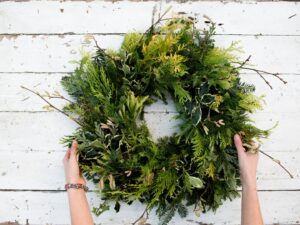By: STUART MERELIE
Stuart Merelie, landscaper, ecological researcher and permaculture fanatic, shares his passion for correct and sustainable landscaping in the Algarve and is our permanent garden and landscaping correspondent. This week is the ninth part in a series of 24 exploring Permaculture and its importance and uses in today’s world.
STUCK IN a truck, in a long queue to the petrol station, in full sun, with no diesel is something I wrote about in my monthly spot two months ago but never expected to experience so soon.
A friend rang me “Two large supermarkets have no eggs, tomatoes or milk!” What must we all do? Can’t go out to eat (no food, no diesel even to get there).
Gosh what a finite state of affairs. Two days of lorry strikes and look at the repercussions. Time to do something, anything. Never before in the history of modern day man
 Stuart’s Spanish eco home – totally off grid and very comfortable. Photos: SUPPLIED |
have we ever been so vulnerable, so unable to even look after ourselves.
Welcome to the future, these queues and tiresome shortages today, will seem like the good times when the ripples of credit crunches and oil at 400 dollars a barrel hit us in a few years time.
Man is an inventor, a modifier and normally a survivor and all he has to do is go off grid.
Off-grid: a place, building or person without mains water or power.
Since the 18th century, we have been persuaded by laws and conscience to accept that all power, water and gas should come from a centralised source. We all expect mains water, mains electricity, telephones and gas to be plumbed to our front door. Some people even want a stronger electricity supply, better mains water pressure.
How the heck can we run the sexy chrome coffee machine, the microwave and the bread maker at the same time otherwise?
It was at this point last year, after installing electric under-floor heating in my farmhouse that I personally woke up.
My quest is this: if the electricity, gas and water supply ceased tomorrow, how would I survive? The answer is – I wouldn’t. But if I knew that on the January 1, 2018 the grid would crash, could I survive? I believe so. I have set myself ten years (now actually nine and a half) to become fully off grid and fully self sufficient in water, food, energy and shelter.
Water. I am about 80 per cent there. I harvest all the rainwater from my roof, have a big storage tank and heat by solar panel. All waste water is captured and used on my fruit trees. I am currently fitting a header tank above the house that will be fed by a small 12 volt pump, eliminating the need for my house pump. Our toilet is a modern waterless compost loo, odour free and lit by a small solar panel and light.
Food. This winter I planted a lot of fruit trees to take advantage of the winter rains. Underneath these trees I constantly rotate a large selection of onions, tomatoes, broccoli, courgettes, peppers, and beetroot – anything that is in season. Since I have to water the trees, the vegetables get watered as well, and the greater the combination (currently random!), the greater the symbiosis and the better the vegetables and the better the fruit. As they mature, then they will require less water and create shade for growing more diverse vegetables in the shade as the Algarve sun blasts down in the summer. My chickens are a big success, free to feed and using little water and producing fantastic eggs. My ducks and geese were a waste of time, since my land is too small to allow them to roam, few eggs and as a vegetarian no use!
I am learning to collect some of the crop as seed but it will take a few years to get anywhere near sufficiency. I guess I manage to grow ten per cent of my food, less in winter.
Electricity. Although I am supplied by EDP 5 verde, a renewable supply, I have been shocked by how much electricity I have used this winter, probably averaging at 500 kwh per month.
Hopeless. Out all day, cooking in the dark, too late to light the fire electric kettle. All excuses. This is my main wish. No EDP, just efficient wood cooking systems, solar ovens and a solar panel or two to power the laptop, stereo and TV.
Gas I have reduced by 75 per cent by fitting the solar panel, and I expect to reduce this completely by building a hi-tech wood fired hob.
Here’s hoping. The diesel ran out two trucks before me. I walked home and wrote this article. Two days later all the pumps were refilled. Should we worry? Oh yes. Will you be ready by January 2018?
With 23 years experience in garden design and construction, Stuart is available for design, consultation and construction of all types of landscaping. He lives near Estoi and is developing a low energy farm which will soon be open as a hostel for likeminded souls with residential courses in low carbon construction and lifestyle. For inquiries, please contact Stuart on 917 814 261.
























